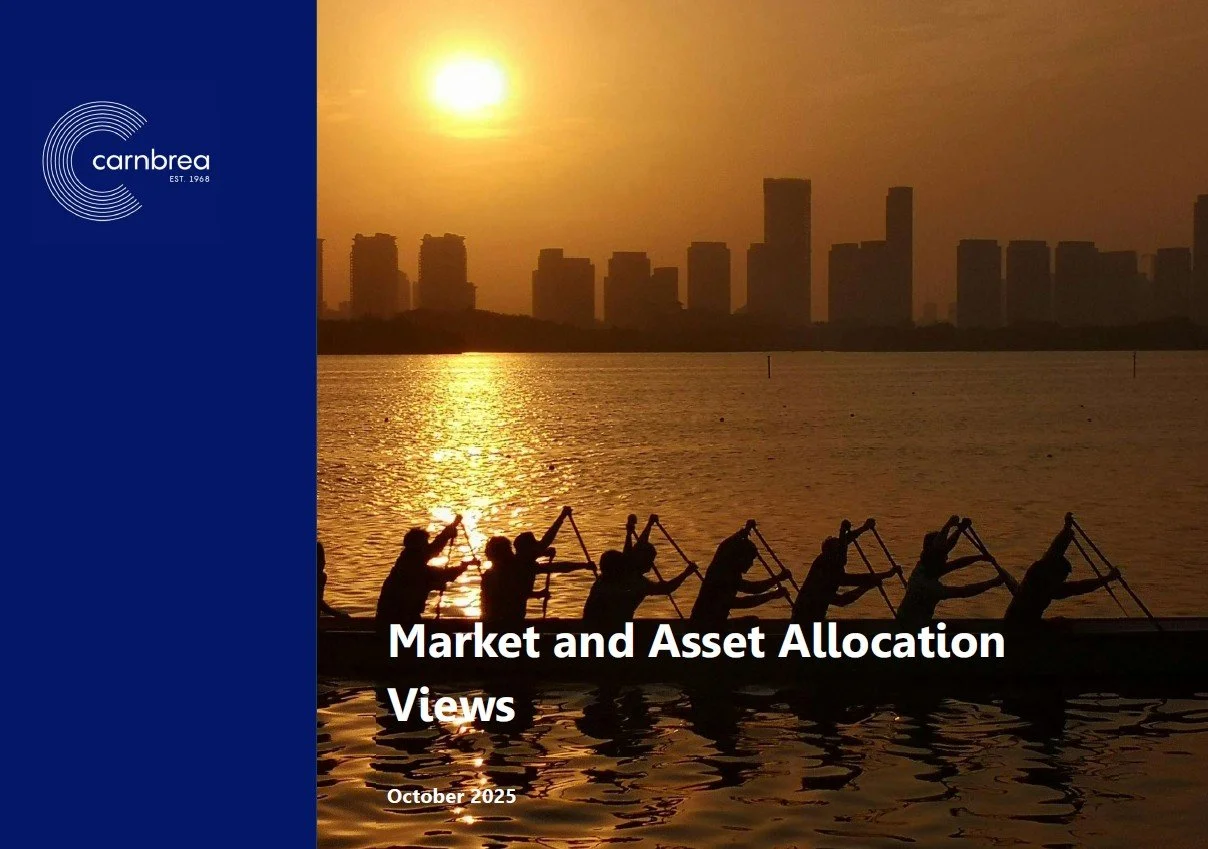Market and Asset Allocation Update – January 2026
Australian equities look expensive with limited upside, so we prefer opportunities offshore, particularly in Emerging Asia, while the US remains supported by policy but is slowly rotating beyond Tech. Europe has lost its valuation edge, property stays Neutral with a tilt to unlisted assets, and alternatives continue to play a key diversification role. We hold Neutral views on bonds and cash, stay selective in credit, favour PE secondaries, and are gradually trimming precious metals after strong gains.
Market and Asset Allocation Update – October 2025
Global asset allocation reflects cautious optimism: US equities benefit from strong earnings, policy support, and AI-driven sentiment, while emerging markets offer attractive risk/reward dynamics amid a weaker USD and selective country appeal. Conversely, Australian and European equities face structural and sectoral headwinds, prompting a shift toward small caps, private markets, infrastructure, and precious metals, with a neutral stance on bonds and cash redeployment into targeted opportunities.
Portfolio Construction Series - Part Four
What is PE?
Private Equity (PE) funds are created in the unlisted space to pool capital from investors to acquire, add value to (by improving operations, changing management etc), manage, and ultimately sell businesses to create sustainable investor value. The lifecycle of a PE fund typically spans 10 years, including initial fundraising, subsequent investment, active management, exits, and ultimately wind-down. They are usually offered as closed end funds and hence illiquid.
Market and Asset Allocation Update – July 2025
Equities positioning leans cautiously across regions with moderate underweights in Australia and the US amid stretched valuations, softening consumer outlooks, and tariff concerns, while Europe sees support from fiscal expansion and global capital shifts; Emerging Markets and China remain neutral as investors await more clarity on tariffs and economic resilience. Meanwhile, falling interest rates bolster views on property, infrastructure, and government bonds, prompting mild overweight calls in selected asset classes, with a continued bullish stance on gold and prudent focus on manager selection in private equity and credit.
Portfolio Construction Series - Part Three
What is PE?
Private Equity (PE) funds are created in the unlisted space to pool capital from investors to acquire, add value to (by improving operations, changing management etc), manage, and ultimately sell businesses to create sustainable investor value. The lifecycle of a PE fund typically spans 10 years, including initial fundraising, subsequent investment, active management, exits, and ultimately wind-down. They are usually offered as closed end funds and hence illiquid.
Market and Asset Allocation Update – May 2025
With global markets adjusting to shifting political landscapes and economic policies, investors must remain vigilant. In Australia, post-election stability ensures policy continuity, but sector rotations—from Banks to Industrials—are expected. The US market holds steady, weighed down by inflation and employment strength, while Europe sees newfound favour amid a market rebalancing. Emerging markets navigate structural challenges, yet trade redirection provides opportunity. Meanwhile, Gold’s meteoric rise is tempered by geopolitical tensions, and Property faces a shift toward unlisted prospects. As government bonds remain neutral and private equity waits on optimism to materialise, investors are encouraged to refine their portfolios for resilience in uncertain times.
Portfolio Construction Series - Part Two
When it comes to active vs. passive management strategies in our portfolio construction – we use both. It’s a “horses for courses” approach.
When do we use an ETF?
Fundamentally, we use an ETF where we cannot find a manager that we believe can offer, over time, a sustainable advantage in performance, net of fees, in the market which we want exposure to.
Oftentimes, this occurs because the underlying market is highly efficient, and after accounting for manager fees, the active manager tends to underperform compared to the available passive alternatives.
Portfolio Construction Series - Part One
One of the big megatrends over the past 20 years has been the sustained rise of Passive Management for the construction of investment portfolios and diminishing the traditional hold that Active Management has had.
A manager is deemed “active” if they have discretion (inside the fund’s rules and disclosed mandate) to buy and sell securities/assets. Active strategies usually rely on managers' research, insights and analytical skills to strive to outperform their chosen market….net of fees.
Passive investing strategies seek to replicate the performance of a chosen market index, usually via an Exchange Traded Fund (ETF) i.e. the ASX 200. If the market price of the index moves in any way, the price of the ETF instantaneously does the same.
Market and Asset Allocation Update – December 2024
Australian, US, and European equities responded positively to Trump's election and hopes on stimulative Chinese economic policies. We have neutral expectations of Australia and still see, despite value, challenges in the Eurozone. On Emerging markets, we remain defensive, property outlook remains neutral with future directions of interest rate dictating fortunes. We remain constructive on private equity, infrastructure, gold, and private credit. Short Bonds are favoured whilst the long end we see little value. Cash is preferred to retain optionality.











